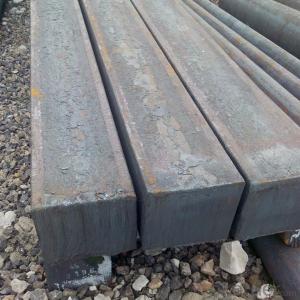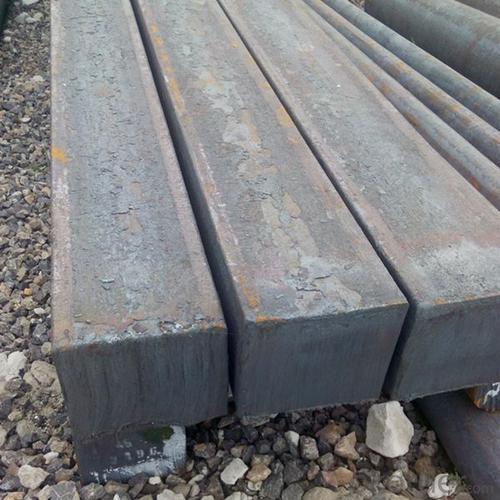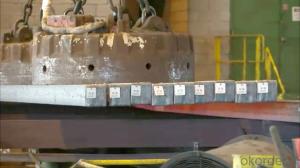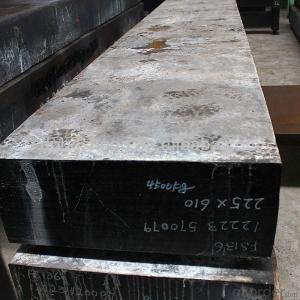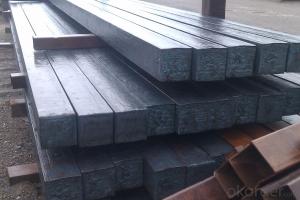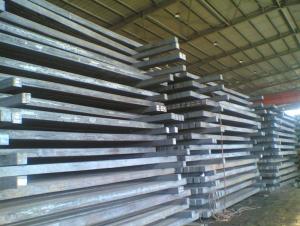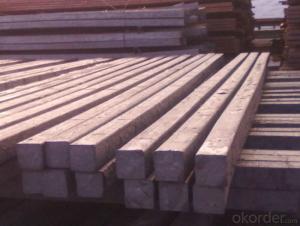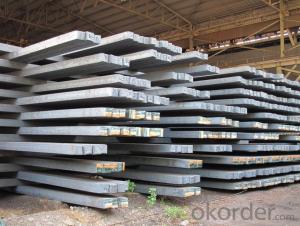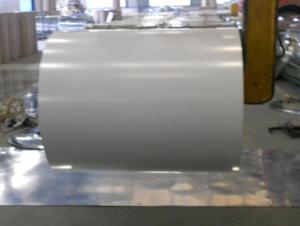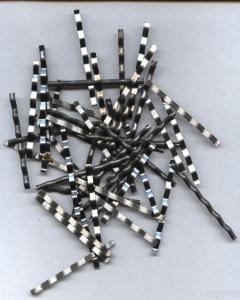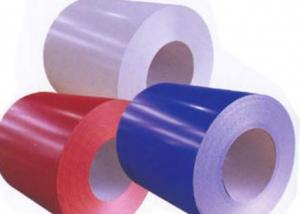Hot Rolled Steel Billet China Supplier Q235/3SP/5SP
- Loading Port:
- China main port
- Payment Terms:
- TT OR LC
- Min Order Qty:
- 1000 m.t.
- Supply Capability:
- 100000 m.t./month
OKorder Service Pledge
OKorder Financial Service
You Might Also Like
Specification
Product Description
Type | Steel billet / Square steel/ Steel square bar |
Standard grade | 3SP/PS, 5SP/PS, Q195, Q235, Q255, Q275, 20MnSi etc. |
MOQ | 1000 MT |
Technique | Hot rolled, Continuous casting and rolling |
Size | 50*50mm ~ 160*160mm |
Length | 3~12m |
Packing | Loose packing, in bundle |
Payment terms | T/T, L/C at sight, Usance L/C |
Trade terms | EXW, FOB, CFR, CIF |
Trans terms | FIO, FILO, FLT |
Inspection | Third party inspection accepted |
Delivery time | 15-30 days, according to the quantity |
Applications | carbon structural steel, wire rod, rod, deformed bars, profile steel, machine parts, and steel moulds etc . |
Note | Customized service is available (for sizes,length and chemical components etc.). |
2.Steel Grade:
Steel Grade | C % | Mn % | Si % | S % | P % |
Q195 | 0.06-0.12 | 0.25-0.50 | 0.30 Max | 0.04 Max. | 0.04 Max. |
Q235 | 0.12-0.22 | 0.30-0.60 | 0.30 Max. | 0.04 Max. | 0.04 Max. |
Q255 | 0.18-0.28 | 0.40-0.70 | 0.30 Max. | 0.045 Max. | 0.050 Max. |
Q275 | 0.27-0.38 | 0.50-0.80 | 0.30 Max. | 0.045 Max. | 0.045 Max. |
3SP | 0.14-0.22 | 0.40-0.85 | 0.15-0.30 | 0.050 Max. | 0.040 Max. |
5SP | 0.28-0.37 | 0.50-1.00 | 0.15-0.30 | 0.050 Max. | 0.040 Max. |
20MnSi | 0.17-0.25 | 1.00-1.60 | 0.40-0.80 | 0.050 Max. | 0.050 Max. |
3.Production Process
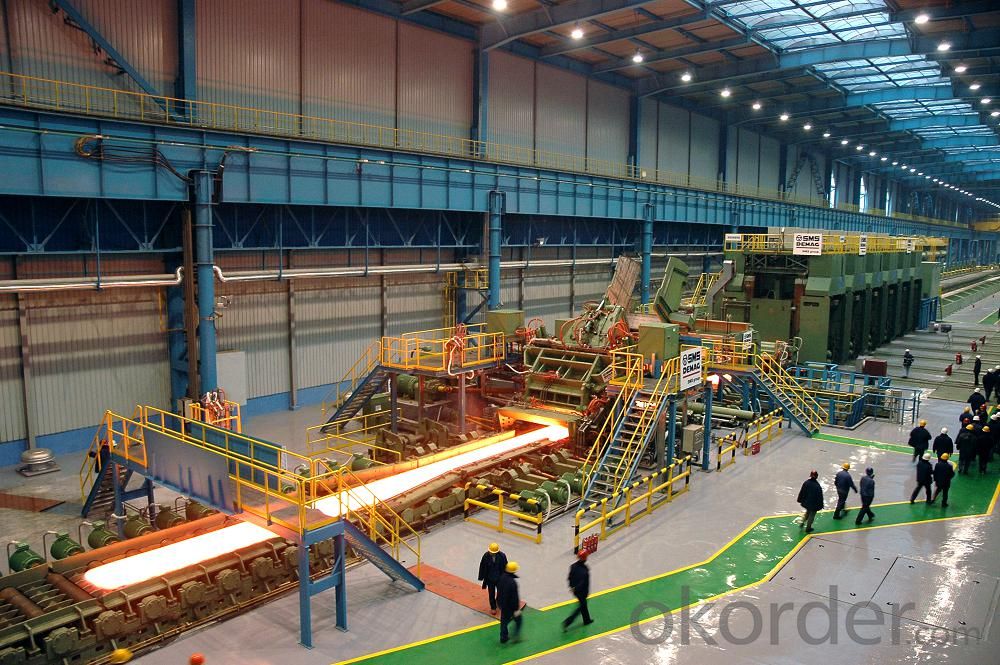
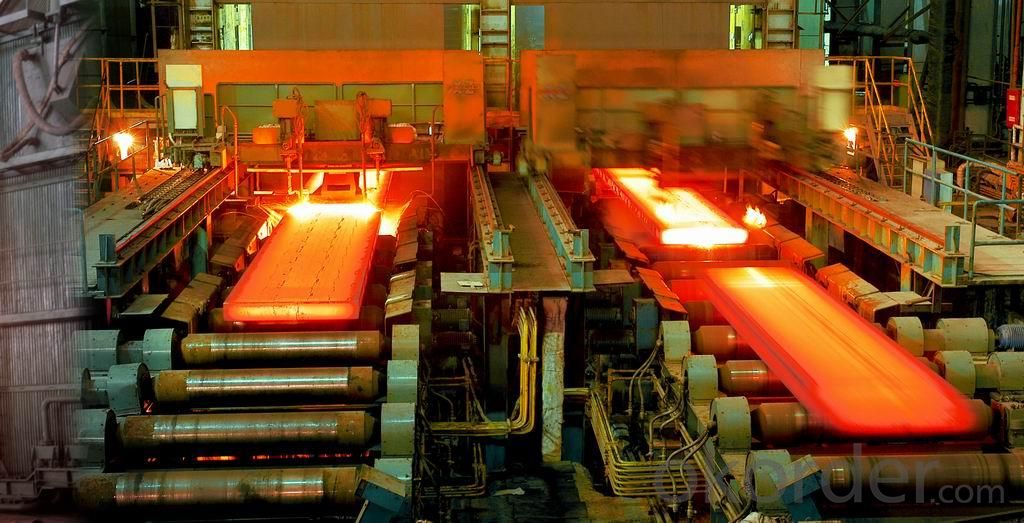
FAQ:
Q: Can I get sample and how long will it take?
A:Yes. We can supply sample. And you need to pay for courier.
Q: What's the MOQ?
A: Our MOQ is 25mt.
Q: What's the delivery time?
A: It will take about 30 days after TT or L/C.
Q: What is the payment terms?
A: T/T, L/C at sight
Q: How does your factory carry out quality control?
A: We attach great importance to quality control.Every part of our products has its own QC.
Q: What certificate do you have?
A: We have SGS, ISO9001 etc. Also we can apply any certificate if you need if the qty is OK.
- Q: What are the different types of steel tubes and their uses?
- There are several different types of steel tubes, each with its own specific uses. Some common types include carbon steel tubes, stainless steel tubes, alloy steel tubes, and galvanized steel tubes. Carbon steel tubes are most commonly used for general-purpose applications such as structural support or fluid transportation. Stainless steel tubes are known for their corrosion resistance and are commonly used in industries such as food processing, medical, and chemical. Alloy steel tubes are made from a combination of different metals and are used in high-temperature or high-pressure applications. Galvanized steel tubes have a protective zinc coating and are often used in outdoor or corrosive environments.
- Q: What are the different types of steel roofing materials?
- There are several types of steel roofing materials available, including corrugated steel, standing seam steel, and steel shingles. Each type offers its own unique benefits and aesthetic appeal.
- Q: How do steel products contribute to the transportation and logistics sector?
- Steel products contribute significantly to the transportation and logistics sector in numerous ways. Firstly, steel is used extensively in the construction of vehicles, such as cars, trucks, trains, ships, and airplanes, providing them with the necessary strength, durability, and safety. Steel also helps in reducing the weight of vehicles, which enhances fuel efficiency and reduces carbon emissions. Moreover, steel is used in the manufacturing of infrastructure and equipment required for transportation and logistics, including bridges, railway tracks, shipping containers, and storage facilities. Its robustness and resilience ensure the smooth and secure movement of goods and people. Overall, steel products play a vital role in improving efficiency, reliability, and sustainability in the transportation and logistics sector.
- Q: How is steel used in the construction of theme parks and recreational facilities?
- Steel is a crucial material in the construction of theme parks and recreational facilities due to its strength, durability, and versatility. It is used for various structural elements such as roller coaster tracks, support beams, and framework for large-scale attractions. Steel's ability to withstand heavy loads and extreme weather conditions ensures the safety and stability of these structures, making it an essential component in creating thrilling and engaging experiences for visitors.
- Q: How is steel used in the production of electrical equipment?
- Steel is used in the production of electrical equipment for various purposes such as housing, structural support, and protection. It is commonly used to manufacture enclosures, cabinets, and mounting brackets that provide a sturdy and secure housing for electrical components. Steel is also used to create structural frames for large electrical equipment like transformers and generators, ensuring stability and durability. Additionally, steel is utilized in the production of electrical equipment due to its ability to shield electromagnetic interference, protecting sensitive electronic components from external disturbances.
- Q: What are the main properties of steel?
- The main properties of steel include high strength, durability, and excellent tensile and compressive strength. Steel also has a high melting point, good thermal conductivity, and is resistant to corrosion and rusting. It is a versatile material that can be easily formed and shaped, making it suitable for a wide range of applications in industries such as construction, automotive, and manufacturing.
- Q: How do steel products contribute to the food and beverage industry?
- Steel products contribute to the food and beverage industry by providing essential equipment and infrastructure. Steel is used to manufacture food processing machinery, such as mixers, extruders, and cutting equipment, which helps streamline production processes and improve efficiency. Steel storage tanks and containers ensure the safety and hygiene of food and beverages during transportation and storage. Additionally, steel is used to construct commercial kitchens, refrigeration units, and packaging materials, ensuring that the food and beverage industry operates smoothly and maintains high standards of quality and safety.
- Q: How are steel pipes used in the transportation of natural gas?
- Steel pipes are used in the transportation of natural gas as they provide a reliable and durable means of transporting the gas over long distances. These pipes are designed to withstand high pressure and are resistant to corrosion, making them suitable for the transmission of natural gas. Additionally, steel pipes are able to maintain the integrity of the gas, ensuring minimal leakage and loss during transportation.
- Q: How is steel tubing used in hydraulic systems?
- Steel tubing is commonly used in hydraulic systems to transmit fluid power by providing a rigid and reliable conduit for the hydraulic fluid. It is used to connect various components in the system, such as pumps, valves, cylinders, and motors, ensuring efficient transfer of hydraulic energy. Steel tubing's high strength, durability, and resistance to pressure and impact make it ideal for handling the high pressures and demanding operating conditions of hydraulic systems.
- Q: What are the different types of steel tanks and their applications in the food processing industry?
- There are several types of steel tanks used in the food processing industry, including stainless steel tanks, carbon steel tanks, and food-grade epoxy-coated steel tanks. Stainless steel tanks are commonly used for storing and processing food products due to their corrosion resistance, easy cleaning, and durability. Carbon steel tanks are often used for bulk storage of ingredients and raw materials, as they are cost-effective and can handle high capacities. Food-grade epoxy-coated steel tanks are suitable for storing acidic or corrosive food products, as the coating provides an additional layer of protection. Overall, these different types of steel tanks serve various purposes in the food processing industry, ensuring the safe and efficient storage and processing of food products.
Send your message to us
Hot Rolled Steel Billet China Supplier Q235/3SP/5SP
- Loading Port:
- China main port
- Payment Terms:
- TT OR LC
- Min Order Qty:
- 1000 m.t.
- Supply Capability:
- 100000 m.t./month
OKorder Service Pledge
OKorder Financial Service
Similar products
Hot products
Hot Searches
Related keywords
